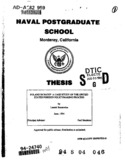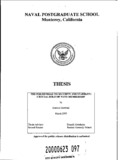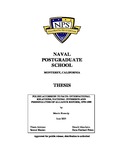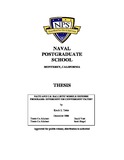Poland in NATO?: a case study of the United States foreign policymaking process Leszek Soczewica.

Download
Author
Soczewica, Leszek
Date
1994-06Advisor
Stockton, Paul
Wincup, G. Kim
Metadata
Show full item recordAbstract
The opportunity for nations such as Poland to enter NATO is of vital concern for their security. Indeed, the problem of inclusion into the Western alliance is the key issue for the majority of former Warsaw Pact members. After the dissolution of the Soviet bloc, these countries are no longer members of a security alliance. Yet, with the end of the Cold War, Poland confronts significant new security risks-- making the need to join an alliance such as NATO all the more important. The United States plays a key role in determining whether Poland will be invited into NATO. What will guide that decision? What lessons can be learned about U.S. decisionmaking from the creation of the Partnership for Peace, and what are the implications for possible Polish entrance into NATO? This thesis is based on interviews with U.S. policymakers on NATO expansion. The history of that policy, especially the creation of the Partnership for Peace as an alternative to immediate alliance expansion, offers a case study for drawing broader conclusions about the U.S. policymaking process. This thesis outlines that history, and argues that bureaucratic politics theories of U.S. policymaking are inadequate to explain the issue of NATO expansion. With the end of the Cold War, and scrambling of previous institutional interests within the U.S. government, those interests provide only limited help in accounting for the policymaking process that Jed to the Partnership for Peace. The fear of hostile Russian reaction to NATO expansion provides much of the rationale for U.S. opposition to inviting nations such as Poland into the alliance. However, significant disagreements persist over this issue, both within and between key U.S. poJicymaking organizations. The fragmentation of power in the U.S. decisionmaking process -- and the attendant need for compromise between actors -- also played a decisive role in the genesis of Partnership for Peace. This same multiplicity of interests and fragmentation of power offers Poland the opportunity to press its case from a variety of useful perspectives.
Rights
This publication is a work of the U.S. Government as defined in Title 17, United States Code, Section 101. Copyright protection is not available for this work in the United States.Collections
Related items
Showing items related by title, author, creator and subject.
-
The Polish road to security and stability: crucial role on NATO membership
Zalewski, Dariusz (Monterey, California. Naval Postgraduate School, 2000-03);Faced at the outset with obstacles of the international system of states and of domestic politics, Poland embraced the tasks of accession to NATO. In this effort, no road map existed for what was an unprecedented situation. ... -
Polish accession to NATO international relations, national interests and personalities of alliance reform, 1979-1999
Kurandy, Marcin L. (Monterey California. Naval Postgraduate School, 2005-06);After the end of the Cold War and the collapse of communism in Poland, the main goal for the Polish nation was integration into the Western collective security organizations. Poland's democratically elected politicians ... -
NATO and U.S. Ballistic Missile Defense programs divergent or convergent paths?
Toms, Kevin E. (Monterey, California. Naval Postgraduate School, 2008-12);NATO and the United States are actively pursuing missile defense policies. NATO has invested in the Active Layered Theatre Ballistic Missile Defence (ALTBMD) information network to support the Theater Missile Defense (TMD) ...


 94Jun_Soczewica.pdf (2.971Mb)
94Jun_Soczewica.pdf (2.971Mb)

